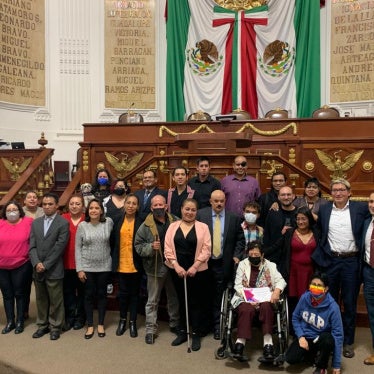The recently published National Development Plan 2025-2030 includes some actions to support people with disabilities. However, it is currently missing a crucial opportunity that could benefit the more than eight million people living with disabilities in the country: the care agenda. People with disabilities can live full and fulfilling lives if they get the support they need. Mexico has been ahead of many other countries in recognizing both this need and the right of people with disabilities to such support. The legal capacity reform signed into law in 2023 is clear evidence of this. However, there are still many areas where progress is needed for the country to implement respect for the rights of people with disabilities as established in international human rights law and national legislation.
Now, a fresh possibility has arisen to advance this agenda. A bill to establish a National Care System, introduced by several Senators last September, presents an excellent opportunity. However, it needs to be much stronger if it is going to make a difference in ensuring the right of people with disabilities to live independently and be included in the community with adequate community support.
Mexico has long depended on family members to provide this support but in many cases, they lack the capacity or the resources to meet people with disabilities’ requirements. The government’s lack of a comprehensive and coherent policy to ensure the right to live independently means that people with disabilities often get low quality support, sometimes bordering on neglect. Such situations have left millions of people with disabilities at risk of violence, including domestic violence.
I remember meeting a man who had to live with his extended family after acquiring a physical disability with high support requirements. They placed him on a hospital bed in the living room, where he was stuck watching old movies and only bathed every eight days. His family, despite their good intentions, simply lacked the resources to provide him with more support.
Predicaments like his still exist for people with disabilities in Mexico because the country’s current disability policies place the onus on a person’s family to provide independent living support instead of supporting appropriately-funded public services.
This is why care and support agendas being advanced in Mexico and other Latin American countries today emphasize the need to create alternative support systems for those who require them—
systems that respect international human rights law. Most important, the Convention on the Rights of Persons with Disabilities, which Mexico ratified in 2007, establishes that people with disabilities have the right to make their own decisions and be treated with dignity and that this fundamental principle should guide all relevant public policies.
However, even countries in Latin America that are trying to improve their services have not sufficiently involved organizations of people with disabilities in the design, administration, and oversight of such services. Mexico’s bill should make certain that these groups are involved.
Even in countries that have made significant progress in advancing rights-respecting care systems, such as Uruguay, there has been little opportunity for people with disabilities to participate in the design and implementation of national care systems, including how they receive support. As a result, Uruguay’s care policies framed people with disabilities as passive care recipients, in a situation of “dependency,” rather than active, autonomous agents who can carry out daily living activities and shape the policies that affect them.
As the care and support agenda gains momentum in Mexico’s federal congress, legislators should ensure the relevant care law addresses the needs of both recipients and providers of care and support. While the legislation before Mexico’s Congress recognizes the rights of unpaid, unrecognized informal caregivers (who are mostly women), it reinforces the problematic “dependency” framing. Another problematic aspect of this bill is that it considers the creation of residential institutions as a care alternative for both people with disabilities and older people. Institutionalization is a form of discrimination against people with disabilities as it promotes segregation and restricts their right to decide how, where, and with whom to live.
The bill also fails to create mechanisms to ensure the direct involvement of people with disabilities in shaping the care and support system. This continues to deny people with disabilities the right to make their own decisions, including about how they receive support.
Several countries have incorporated specific organizational models to promote the active participation of people with disabilities. Centers for independent living, which are run by people with disabilities, are one model that exists in Costa Rica, as well as Australia, Japan, Sweden, the United Kingdom, and the United States, among others. These centers provide referrals to essential services that support independent living, such as accessible housing, life skills development, and strategies for deinstitutionalization.
Mexico’s bill needs to include both involvement by people with disabilities and provisions for the resources needed.
The law before Congress provides an opportunity for Mexico to become a leader in disability rights. To that end, legislators should ensure the law establishing a national care and support system considers and learns from international norms and good practices so everyone can live independently and be included in the community, with whatever support is required.









